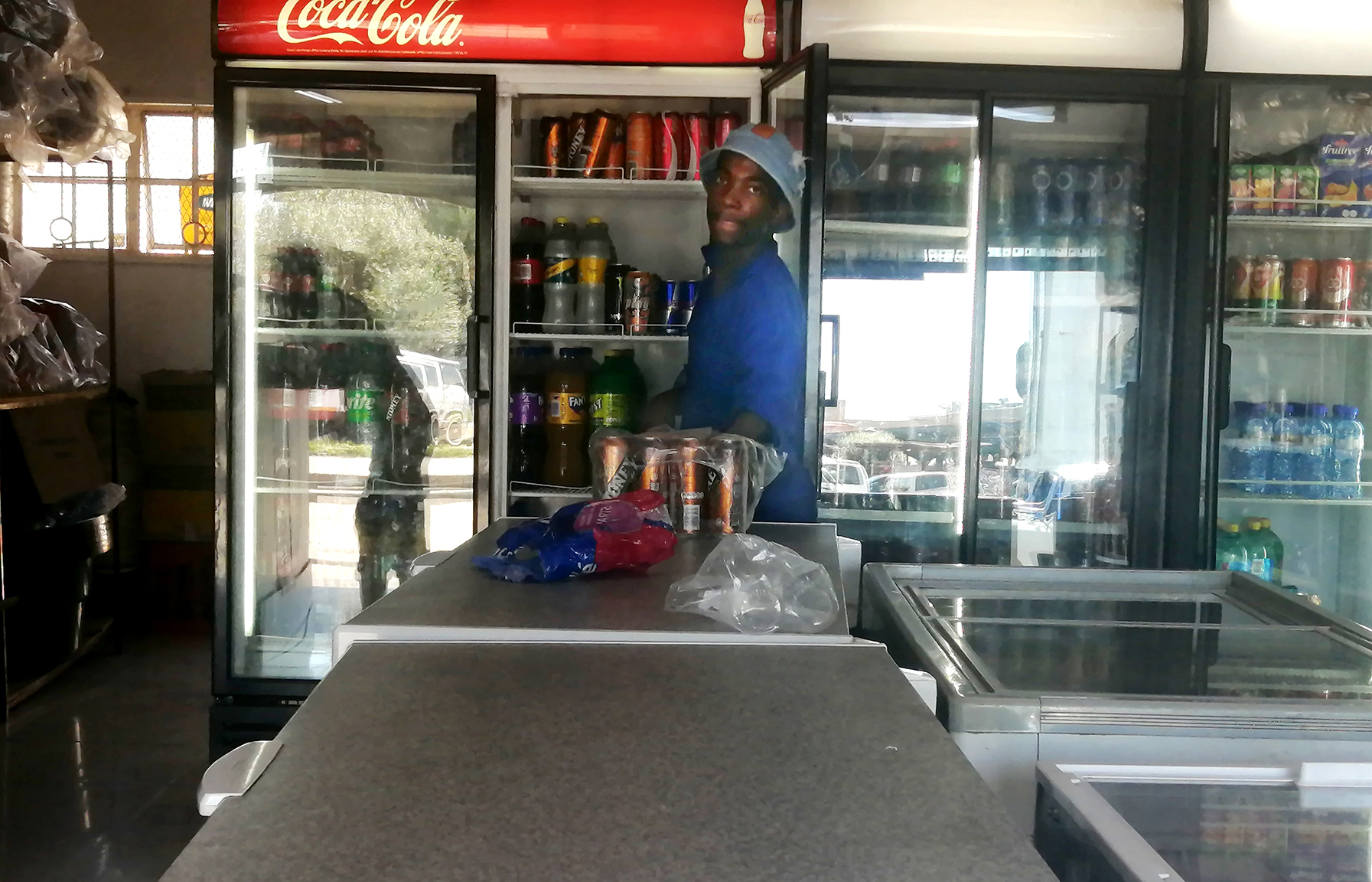Ifran Patel, the owner of Lenasia’s Supermarket Station, said the return of load shedding this week was already having a dismal effect on his business.
“The load shedding has had a devastating impact. It feels like I am already out of business. Business is run on a plan and at the moment I do not have a plan because I cannot buy more stock,” Patel told Daily Maverick.
“Load shedding is affecting our business too much. If it’s load shedding hours, it means I cannot cook the chickens in the electric machine and business literally stalls. We are now using the gas bottle for cooking and it’s costing a lot.”
 A customer arrives to buy a cold drink at Delicious Fast Food and Beverages in Lenasia. Owner Ifran Patel says he is losing business. (Photo: Bheki Simelane)
A customer arrives to buy a cold drink at Delicious Fast Food and Beverages in Lenasia. Owner Ifran Patel says he is losing business. (Photo: Bheki Simelane)
After celebrating 300 days without load shedding in January 2025, Eskom announced a brief period of power outages in early February followed by prolonged load shedding this week.
Read more: Load shedding Stage 6 shock — Ramokgopa rules out sabotage, says ‘the buck stops’ with him
Patel is not alone. Many small retailers are beginning to feel the pinch. They have raised concerns about spoilt stock, damaged electrical appliances and huge income losses.
Hossain Nur, boss of Delicious Fast Foods near the Lenasia taxi rank, told Daily Maverick this week that he was spending R1,150 on gas daily.
This was besides his losses on cold drinks sales, which had suffered since his fridges were out of operation.
“Cold drinks are my best sellers and since the load shedding started, I am not selling even a quarter of what I used to sell because it’s hot and people want cold drinks,” Nur said.
One of his fridges also broke down during the power cuts.
“I haven’t even calculated the loss as a result of the broken fridge. The R1,150 is just what I lose each load shedding day. I have to swap from electricity to gas,” he said.
“It’s the uncertainty for me. I do not know whether I should stock more cold drinks or not, but as things currently stand, I have stopped stocking more cold drinks. I have already lost a lot on frozen juices which I had to throw away because the fridges had been off for way too long. And business is suffering immensely,” he said.
“Business has been going very smoothly. And now it’s load shedding and it’s very quiet because people want cold stock. If the cold drink or any other refrigerated stuff isn’t cold, the people walk away. My business is falling apart. I don’t know how long load shedding will go on,” said Nur.
“The cold room stuff is my best seller, cold drinks, treats and frozen juices. My customers buy these a lot, and for every R2,000 I make, I lose R500 daily. That’s a lot of money for this size business,” Nur said.
Read more: How to beat load shedding at home... and other ideas
A spaza shop owner in the Waterworks informal settlement, near Lenasia, who did not want to be named, said it was very difficult for his small business to remain open during load shedding.
“You have to deal with a lot of pain from the losses, but mostly pain from watching your daily customers go past your shop to support other local businesses, because … you cannot provide optimum services,’’ he said.
“Township customers are loyal, but they can also be more loyal to their desires than you as a business owner.”
Amanda Nhlabathi, who runs a spaza shop in Orlando, Soweto, however, said she had learnt from previous bouts of load shedding.
“As a business, small as we might be, we learnt a lot from the past. We cannot operate nonchalantly. Load shedding is a blow to every business, including those businesses that do not require much electricity to run, because their associates will use electricity and they will also one way or the other incur the costs,” said Nhlabathi.
“I haven’t suffered because I learnt from my huge losses through load shedding and bought myself a big enough generator. So, I am okay, not bothered.” DM




 A customer on a bicycle pulls up to buy a colddrink at Delicious Fast Food and Beverages in Lenasia. Owner Ifran Patel says he is losing a lot if business.
(Photo: Bheki Simelane)
A customer on a bicycle pulls up to buy a colddrink at Delicious Fast Food and Beverages in Lenasia. Owner Ifran Patel says he is losing a lot if business.
(Photo: Bheki Simelane) 